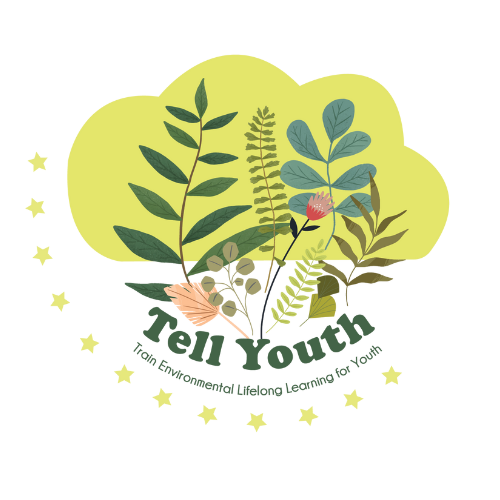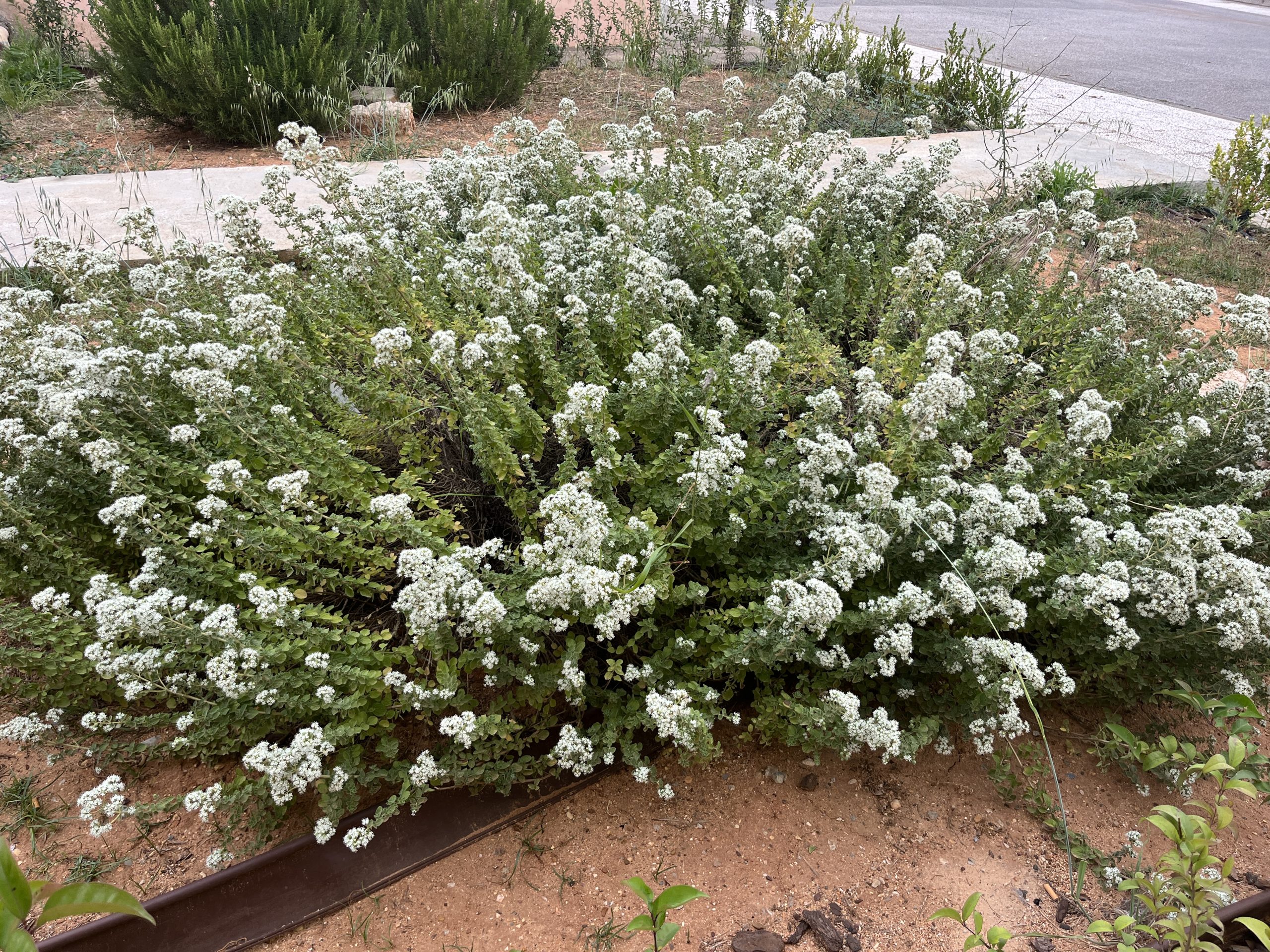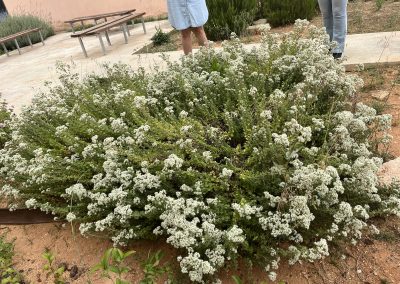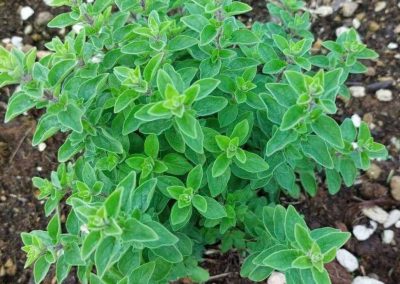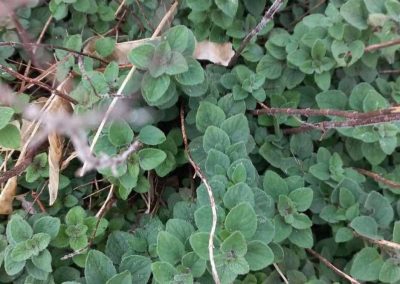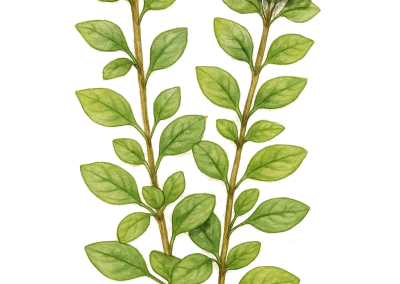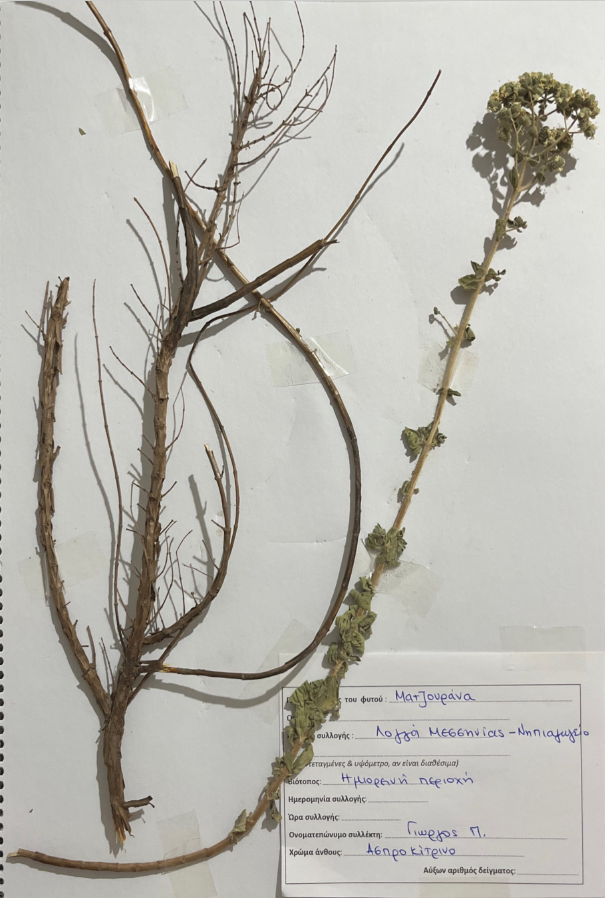Origanum majorana
Scientific description
Scientific name: Origanum majorana
Common names: Sweet Marjoram, Knotted Marjoram
Kingdom: Plantae | Phylum: Tracheophyta | Class: Magnoliopsida | Order: Lamiales | Family: Lamiaceae | Genus: Origanum | Species: O. majorana L.
Origin: Native to the Mediterranean, particularly Cyprus, Turkey, and northern Africa. Cultivated widely in Europe, the Middle East, and the Americas for culinary and medicinal use.
Description: Tender perennial herb (often grown as annual in cool climates), 20–60 cm tall, woody stems at base, grey-green oval aromatic leaves, small white to pale pink flowers in knotted-like heads. Sweet, warm, slightly spicy aroma.
Propagation: By seed, cuttings, or division.
Ecology: Attracts pollinators; prefers full sun and well-drained neutral to alkaline soil; thrives in warm climates; relatively pest- and drought-tolerant.
Usage: Culinary (seasoning, teas), Medicinal (digestive aid, antimicrobial, anti-inflammatory), Cosmetic & Aromatherapy (essential oils), Ornamental (herb gardens, borders, containers).
Επιστημονική ονομασία: Origanum majorana
Κοινές ονομασίες: Γλυκιά Μαντζουράνα, Ματζουράνα με κόμπους
Βασίλειο: Plantae | Φύλο: Tracheophyta | Κλάση: Magnoliopsida | Τάξη: Lamiales | Οικογένεια: Lamiaceae | Γένος: Origanum | Είδος: O. majorana L.
Καταγωγή: Κύπρος, Τουρκία, βόρεια Αφρική. Καλλιεργείται σε Ευρώπη, Μέση Ανατολή, Αμερική για μαγειρική και φαρμακευτική χρήση.
Περιγραφή: Τρυφερό πολυετές βότανο (συχνά ετήσιο σε ψυχρά κλίματα), ύψος 20–60 εκ., ξυλώδη στελέχη στη βάση, γκριζοπράσινα ωοειδή αρωματικά φύλλα, μικρά λευκά έως ροζ άνθη σε κεφαλές που μοιάζουν με κόμπους. Γλυκό, ζεστό, ελαφρώς πικάντικο άρωμα.
Διάδοση: Με σπόρο, μοσχεύματα ή διαίρεση.
Οικολογία: Προσελκύει επικονιαστές, πλήρης ήλιος, καλά στραγγιζόμενο ουδέτερο/αλκαλικό έδαφος, ευνοεί θερμά κλίματα, σχετικά ανθεκτικό σε παράσιτα και ξηρασία.
Χρήση: Μαγειρική, φαρμακευτική, καλλυντικά/αρωματοθεραπεία, καλλωπιστικό (κήποι βοτάνων, μπορντούρες, δοχεία).
Nom scientifique: Origanum majorana
Noms communs: Marjolaine douce, Marjolaine nouée
Règne: Plantae | Phylum: Tracheophyta | Classe: Magnoliopsida | Ordre: Lamiales | Famille: Lamiaceae | Genre: Origanum | Espèce: O. majorana L.
Origine: Méditerranée (Chypre, Turquie, Afrique du Nord). Cultivé largement en Europe, Moyen-Orient, Amériques pour usage culinaire et médicinal.
Description: Herbe vivace tendre (souvent annuelle dans climats froids), 20–60 cm, tiges ligneuses à la base, feuilles gris-vert ovales et aromatiques, petites fleurs blanc à rose pâle en têtes noueuses. Arôme doux, chaud, légèrement épicé.
Propagation: Graines, boutures, division.
Écologie: Attire pollinisateurs, plein soleil, sol bien drainé, neutre à alcalin, prospère dans climats chauds, relativement résistant aux ravageurs et sécheresse.
Utilisation: Culinaire, médicinale, cosmétique/aromathérapie, ornementale (jardins d’herbes, bordures, conteneurs).
Denumire științifică: Origanum majorana
Nume comune: Măghiran, Măghiran împletit
Regn: Plantae | Phylum: Tracheophyta | Clasă: Magnoliopsida | Ordin: Lamiales | Familie: Lamiaceae | Gen: Origanum | Specie: O. majorana L.
Origine: Regiunea mediteraneană (Cipru, Turcia, Africa de Nord). Cultivată în Europa, Orientul Mijlociu și America pentru uz culinar și medicinal.
Descriere: Plantă perenă sensibilă (adesea anuală în climate reci), 20–60 cm, tulpini lemnoase la bază, frunze ovale aromatice gri-verzui, flori mici alb-roz pal în ciorchini împletiți. Aromă dulce, caldă, ușor picantă.
Înmulțire: Semințe, butași, divizare.
Ecologie: Atrage polenizatori, soare plin, sol bine drenat neutru-alcalin, prosperă în climate calde, relativ rezistent la dăunători și secetă.
Utilizare: Culinar, medicinal, cosmetic/aromaterapie, ornamental (grădini de plante aromatice, borduri, ghivece).
Creative writing inspired by Origanum majorana
Origanum majorana
Once upon a time, in ancient Greece, there was a young woman named Marjorana, known for her kindness and beauty. She lived in a small village at the foot of a lush mountain, where all the flowers and plants flourished under her loving care.
Marjorana had a rare gift: she could communicate with plants and understand their needs. In return, the trees offered her their shade, the flowers their fragrance, and the herbs their healing properties. Among all the plants, there was one with small, soft leaves and a particularly sweet aroma. This plant was her favorite, and she nurtured it with special care. It was Origanum, which later came to be known as Marjoram in her honor.
One day, the god Apollo, wandering through the mountains, saw Marjorana tending to her plants. He was captivated by her gentle spirit and her beauty. Impressed by her dedication to nature, he offered her immortality so she could continue to care for her plants forever.
But Marjorana, with humility, declined the gift of immortality, saying she wished to live as all mortals do. Apollo, respecting her wish, decided to give her a different gift: he transformed her soul into her beloved plant, which from then on was called Marjoram.
From that moment, the plant became a symbol of peace, serenity, and gratitude towards nature. It was believed that whoever cultivated Marjoram would always have peace in their heart, and its fragrance was said to have the power to calm people and bring happiness into their homes.
And so, the myth of Origanum Majorana was born, a plant that not only heals the body but also the soul, offering tranquility and harmony to those who cherish it.

